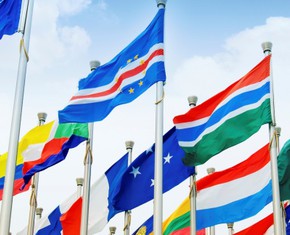The views expressed in our content reflect individual perspectives and do not represent the authoritative views of the Baha'i Faith.
As everyone knows, our world displays a vast distance between wealthy nations and poor nations.
Much of the global politics we see today has to do with protecting and preserving that vast distance. Wealthy nations want to stay wealthy, and increase their wealth. Poor nations want to grow into wealthy ones. That dynamic sets up a competitive landscape. Many countries use every means at their disposal—harsh trade policies, immigration restrictions, military dominance, monopolies on raw materials, high tariffs, foreign investment laws, etc., etc.—to heighten their own national prosperity, without much care or consideration for the prosperity of other countries.
Have you ever thought about the source of that logic?
Based on a strange and unnerving central notion—that one nation can prosper independently of other nations, or even at their expense—the logic behind it still rules the world today.
But the more enlightened and progressive elements in human society have recognized that logic for what it is—a selfish and entitled attitude toward the rest of the human race. They’ve begun to ask: Why should one country prosper when others suffer? Do we live in a zero-sum world, where only so much prosperity is even possible? Or does a rising tide lift all boats? Does the Earth provide us with sufficient abundance that everyone can have a fair share of its prosperity?

In zero-sum theory, when one person wins, another person loses. That’s the way we’ve generally understood the system of nationalism the Earth has operated under for the past two-and-a-half centuries. When one country advances, another retreats. When one country wins, another loses. That also describes the Darwinian view of the survival of the fittest—what the Baha’i teachings call “the origin of all difficulties:”
In the world of nature the greatest dominant note is the struggle for existence—the result of which is the survival of the fittest. The law of the survival of the fittest is the origin of all difficulties. It is the cause of war and strife, hatred and animosity, between human beings. In the world of nature there is tyranny, egoism, aggression, overbearance, usurpation of the rights of others and other blameworthy attributes which are the defects of the animal world.
Therefore so long as the requirements of the natural world play paramount part among the children of men, success and prosperity are impossible; for the success and prosperity of the human world depend upon the qualities and virtues with which the reality of humanity is adorned while the exigencies of the natural world work against the realization of this object. – Abdu’l-Baha, Star of the West, Volume 4, pp. 133-134.
In other words, a purely material civilization bases itself on the zero-sum game called survival of the fittest, where one wins and another loses. But from a Baha’i perspective, a divine civilization, based on the spiritual virtues of love, kindness, justice and equity, operates with a completely different framework and philosophy—that we live in a world of abundance and bounty, where prosperity for all can become a reality:
Thus material civilization alone does not insure the safety and progress of mankind, but brings into existence the greatest instruments for human fratricide and destruction of property, and animalistic propensities reach their height under its influence.
Divine civilization, on the other hand, assists man in acquiring heavenly virtues, thus freeing him from oppression, cruelty, and greed brought about by the exploitation of his fellow-man for his own gain. – Ibid.
Interestingly, most expert economists and futurists now agree that we do not live in a zero-sum world. Your prosperity does not threaten mine. We can all prosper if we base our cultures on spiritual rather than material values. If we focus on sharing rather than selfish acquisition, we have the ability to feed, clothe and house everyone on the planet. As society becomes more complex, specialized and interdependent, says the author and futurist Robert Wright in his book Nonzero: The Logic of Human Destiny, it increasingly moves away from a zero-sum equation toward a model of shared prosperity.
All we have to do to reach that advanced state of society, the Baha’i teachings say, is recognize the difference between the personal and the universal:
Human undertakings are divided into two kinds – universal and personal.
Those efforts which create general interest are universal; their results are likewise universal for humanity has become interdependent. The international laws of to-day are of vast importance, for as international politics bring nations nearer to one another – and thus promote a bond of oneness which acts as a magnet to attract the divine confirmations – the results and benefits are limitless. Therefore, let us say that every universal cause is divine and every personal matter is human or limited. – Abdu’l-Baha, Divine Philosophy, pp. 141-142.
Can we share our prosperity, if we live in prosperous countries? Can we move past a strictly localized standard of living? Can we create that rising tide that lifts all boats?
We can, if we increase our consciousness of the organic oneness of the whole human race. We can, if we begin to think of all people as members of our immediate family. We can, if we will move our thinking from the personal to the universal. We can, if we unify and build a just global government:
Two calls to success and prosperity are being raised from the heights of the happiness of mankind, awakening the slumbering, granting sight to the blind, causing the heedless to become mindful, bestowing hearing upon the deaf, unloosing the tongue of the mute and resuscitating the dead.
The one is the call of civilization, of the progress of the material world. This pertaineth to the world of phenomena, promoteth the principles of material achievement, and is the trainer for the physical accomplishments of mankind. It compriseth the laws, regulations, arts and sciences through which the world of humanity hath developed; laws and regulations which are the outcome of lofty ideals and the result of sound minds, and which have stepped forth into the arena of existence through the efforts of the wise and cultured in past and subsequent ages. The propagator and executive power of this call is just government.
The other is the soul-stirring call of God, Whose spiritual teachings are safeguards of the everlasting glory, the eternal happiness and illumination of the world of humanity, and cause attributes of mercy to be revealed in the human world and the life beyond.
This second call is founded upon the instructions and exhortations of the Lord and the admonitions and altruistic emotions belonging to the realm of morality which, like unto a brilliant light, brighten and illumine the lamp of the realities of mankind. Its penetrative power is the Word of God.
However, until material achievements, physical accomplishments and human virtues are reinforced by spiritual perfections, luminous qualities and characteristics of mercy, no fruit or result shall issue therefrom, nor will the happiness of the world of humanity, which is the ultimate aim, be attained. – Abdu’l-Baha, Selections from the Writings of Abdu’l-Baha, pp. 282-284.
















Comments
Sign in or create an account
Continue with Googleor